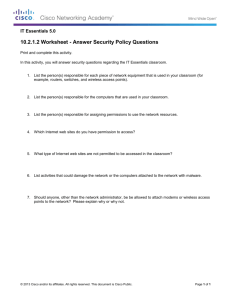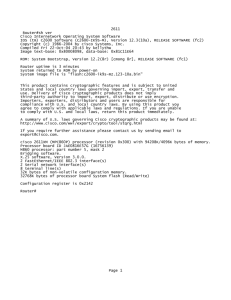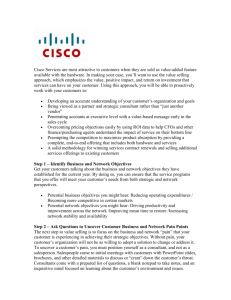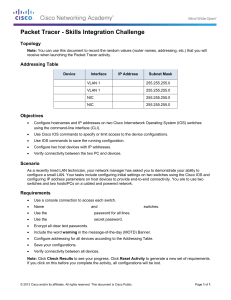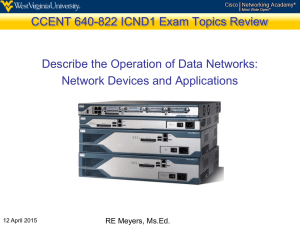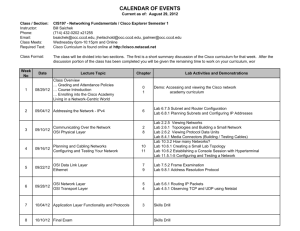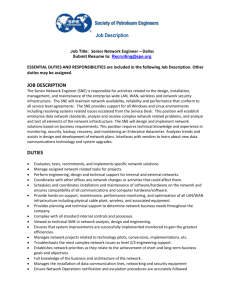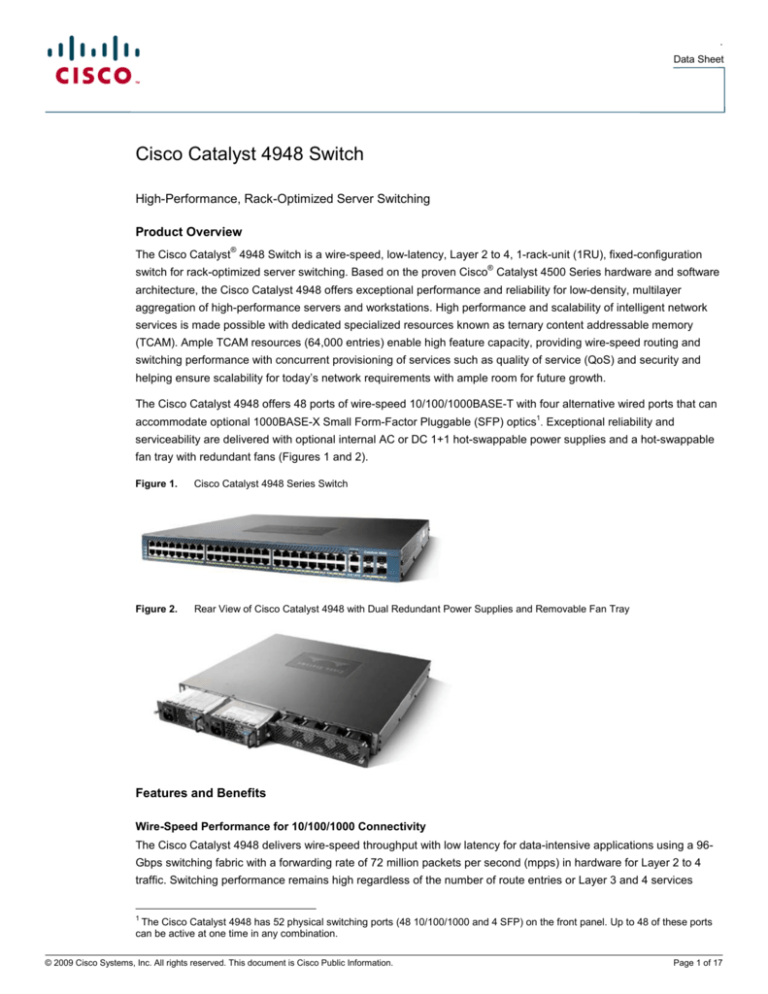
.
Data Sheet
Cisco Catalyst 4948 Switch
High-Performance, Rack-Optimized Server Switching
Product Overview
®
The Cisco Catalyst 4948 Switch is a wire-speed, low-latency, Layer 2 to 4, 1-rack-unit (1RU), fixed-configuration
®
switch for rack-optimized server switching. Based on the proven Cisco Catalyst 4500 Series hardware and software
architecture, the Cisco Catalyst 4948 offers exceptional performance and reliability for low-density, multilayer
aggregation of high-performance servers and workstations. High performance and scalability of intelligent network
services is made possible with dedicated specialized resources known as ternary content addressable memory
(TCAM). Ample TCAM resources (64,000 entries) enable high feature capacity, providing wire-speed routing and
switching performance with concurrent provisioning of services such as quality of service (QoS) and security and
helping ensure scalability for today’s network requirements with ample room for future growth.
The Cisco Catalyst 4948 offers 48 ports of wire-speed 10/100/1000BASE-T with four alternative wired ports that can
accommodate optional 1000BASE-X Small Form-Factor Pluggable (SFP) optics1. Exceptional reliability and
serviceability are delivered with optional internal AC or DC 1+1 hot-swappable power supplies and a hot-swappable
fan tray with redundant fans (Figures 1 and 2).
Figure 1.
Cisco Catalyst 4948 Series Switch
Figure 2.
Rear View of Cisco Catalyst 4948 with Dual Redundant Power Supplies and Removable Fan Tray
Features and Benefits
Wire-Speed Performance for 10/100/1000 Connectivity
The Cisco Catalyst 4948 delivers wire-speed throughput with low latency for data-intensive applications using a 96Gbps switching fabric with a forwarding rate of 72 million packets per second (mpps) in hardware for Layer 2 to 4
traffic. Switching performance remains high regardless of the number of route entries or Layer 3 and 4 services
1
The Cisco Catalyst 4948 has 52 physical switching ports (48 10/100/1000 and 4 SFP) on the front panel. Up to 48 of these ports
can be active at one time in any combination.
© 2009 Cisco Systems, Inc. All rights reserved. This document is Cisco Public Information.
Page 1 of 17
Data Sheet
enabled. Hardware-based Cisco Express Forwarding routing architecture enables increased scalability and
performance.
Power Supply Redundancy for Nonstop Operation
The Cisco Catalyst 4948 provides reliability for critical applications with 1+1 redundant hot-swappable internal AC or
DC power supplies. The 1+1 power supply design provides A-to-B failover when power supplies are connected to
different circuits. AC and DC power supplies can be mixed in the same unit for outstanding deployment flexibility.
The Cisco Catalyst 4948 also has a hot-swappable fan tray with four redundant fans for additional serviceability and
availability.
Comprehensive Management
The Cisco Catalyst 4948 includes a single, dedicated 10/100 console port and a single, dedicated 10/100
management port for offline disaster recovery. Remote in-band management is available with the Simple Network
Management Protocol (SNMP), Telnet client, Bootstrap Protocol (BOOTP), and Trivial File Transfer Protocol (TFTP).
Support for local or remote out-of-band management is delivered through a terminal or modem attached to the
console interface. The management port helps enable the Cisco Catalyst 4948 to reload a new image from a TFTP
server within seconds.
The Cisco Catalyst 4948 delivers a comprehensive set of management tools to provide the visibility and control
required for server switching. Managed with CiscoWorks solutions and embedded CiscoWorks CiscoView, the Cisco
Catalyst 4948 can be configured and managed to deliver device, VLAN, traffic, and policy management. These webbased management tools offer numerous services, including software deployment and quick isolation of error
conditions.
Software Configuration Options
Table 1 summarizes the software configuration options for the Cisco Catalyst 4948.
Table 1.
Software Configuration Options for Cisco Catalyst 4948
Software Image
Description
LAN Base Image
Basic Layer 2 image
IP Base Image
Standard Layer 3 image, including Routing Information Protocol Version 1 (RIPv1), RIPv2, static routes, and Enhanced
Interior Gateway Routing Protocol (EIGRP) stub
Enterprise Services
Image
Enhanced Layer 3 image, including Open Shortest Path First (OSPF), Intermediate System-to-Intermediate System
(IS-IS), EIGRP, Border Gateway Protocol (BGP), AppleTalk, and Internetwork Packet Exchange (IPX) software routing;
also includes all IP Base image features
Feature Comparison
Table 2 compares the features of the Cisco Catalyst 4948 Switch, Catalyst 4948 10 Gigabit Ethernet Switch, and
Catalyst 4900M Switch.
Table 2.
Cisco Catalyst 4900 Series Switches Model Comparison
®
Feature and Description
Cisco Catalyst 4948
Cisco Catalyst 4948 10 Gigabit
Ethernet
Cisco Catalyst 4900M
Switching Capacity
Throughput
96 Gbps
136 Gbps
320 Gbps
72 mpps
102 mpps
IPv6 Support
In Software
In Software
In Hardware
Height
1RU
1RU
2RU
Modular Half-Card Slots
0
0
2
Maximum 10/100/1000 Ports
48
48
40
© 2009 Cisco Systems, Inc. All rights reserved. This document is Cisco Public Information.
● 250 mpps for IPv4
● 125 mpps for IPv6
Page 2 of 17
Data Sheet
®
Feature and Description
Cisco Catalyst 4948
Cisco Catalyst 4948 10 Gigabit
Ethernet
Cisco Catalyst 4900M
Maximum 10 Gigabit Ethernet
Ports
0
2
24
Maximum Gigabit Ethernet
(Fiber) Ports
4
0
32 (Cisco TwinGig Converter
Module)
Cisco TwinGig Converter Module
Support
No
No
Yes (half-cards only)
Uplink Optic Type
4 Small Form-Factor Pluggable
(SFP) optics
2 X2 (10 Gigabit Ethernet) optics
8 X2 (10 Gigabit Ethernet) optics
Multilayer Switching
IP Base and Enterprise Services
options
IP Base and Enterprise Services
options
IP Base and Enterprise Services
options
Shared Buffer
16 MB
16 MB
16 MB
CPU
266 MHz
666 MHz
1.3 GHz
Synchronous Dynamic RAM
(SDRAM)
256 MB
256 MB
512 MB
Active VLANs
4096
4096
4096
Multicast Entries
● 28,000 (Layer 3)
● 16,000 (Layer 2)
● 28,000 (Layer 3)
● 16,000 (Layer 2)
● 56,000 for IPv4
● 28,000 for IPv6
Per-VLAN Spanning Tree (PVST)
and VLAN IDs
4096
4096
4096
Spanning Tree Protocol
Instances
1500
1500
3000
Switched Virtual Interfaces (SVIs) 2000
2000
4000
Security and QoS Hardware
Entries
32,000
32,000
128,000
MAC Addresses
32,000
55,000
55,000
Switched Port Analyzer (SPAN)
2 ingress and 4 egress
2 ingress and 4 egress
8 ingress and 8 egress
USB Port
No
No
Yes
Compact Flash Memory Support
No
No
Yes
System Reset Button
No
No
Yes
Minimum Software Requirement
Cisco IOS® Software Release
12.2(20)EWA or later
Cisco IOS Software Release
12.2(25)EWA or later
Cisco IOS Software Release
12.2(40)XO or later in both Data
sheets
Features and Specifications at a Glance
Performance and Switching
●
96 Gbps nonblocking switch fabric
●
72 mpps Layer 2 forwarding (hardware)
●
72 mpps Layer 3 and 4 forwarding: IP routing and Cisco Express Forwarding (hardware)
●
Layer 2 to 4 hardware-based switch engine (application-specific integrated circuit [ASIC]-based)
●
Unicast and multicast routing entries: 32,000
●
Support for 4096 active VLANs and 4096 VLAN IDs per switch
●
Layer 2 multicast addresses: 16,384
●
MAC addresses: 32,768
●
Policers: 512 ingress and 512 egress
●
Access control list (ACL) and QoS entries: 32,000
●
Uplinks: 4 alternatively wired SFP ports with Cisco Gigabit EtherChannel support
●
Latency: 6 microseconds for 64-byte packets
© 2009 Cisco Systems, Inc. All rights reserved. This document is Cisco Public Information.
Page 3 of 17
Data Sheet
●
SVIs: 2048
●
Spanning Tree Protocol instances: 1500
●
Internet Group Management Protocol (IGMP) snooping entries: 8000
Layer 2 Features
●
Layer 2 hardware forwarding at 72 mpps
●
Layer 2 switch ports and VLAN trunks
●
IEEE 802. 1Q VLAN encapsulation
●
Inter-Switch Link (ISL) VLAN encapsulation
●
Dynamic Trunking Protocol (DTP)
●
VLAN Trunking Protocol (VTP) and VTP domains
●
PVST+ and Per-VLAN Rapid Spanning Tree Protocol (PVRST)
●
Flexlink
●
Spanning Tree PortFast and PortFast Guard
●
Spanning Tree UplinkFast and BackboneFast
●
IEEE 802.1s
●
IEEE 802.1w
●
IEEE 802.3ad
●
Spanning Tree Root Guard
●
Cisco Discovery Protocol Version 1 and 2
●
IGMPv1, v2, and v3
●
Cisco EtherChannel technology, Cisco Fast EtherChannel technology, and Cisco Gigabit EtherChannel
technology support
●
Port Aggregation Protocol (PAgP)
●
Link Aggregation Control Protocol (LACP)
●
Unidirectional Link Detection Protocol (UDLD) and aggressive UDLD on the SFP ports
●
IEEE 802.1 QinQ in hardware
●
Layer 2 protocol tunneling
●
Jumbo frames on all ports (up to 9216 bytes)
●
Baby giants (up to 1600 bytes)
●
Unidirectional Ethernet
●
Hardware-based storm control (formally known as broadcast and multicast suppression)
●
Community private VLANs (PVLANs)
●
Forced 10/100 autonegotiation
●
Web Cache Communication Protocol (WCCP) Version 2 Layer 2 redirect
●
Private VLAN promiscuous trunk
●
Layer 2 promiscuous trunk over trunk port (L2PT)
●
Class-of-service (CoS) mutation
●
E-OAM 802.3ah and CFM: 802.1ag
© 2009 Cisco Systems, Inc. All rights reserved. This document is Cisco Public Information.
Page 4 of 17
Data Sheet
Layer 3 Features
●
Jumbo frames on all ports (up to 9216 bytes)
●
Hardware-based IP Cisco Express Forwarding routing at 72 mpps
●
Static IP routing
●
IP routing protocols: EIGRP, OSPF, RIP, and RIP2
●
BGPv4 and Multicast Border Gateway Protocol (MBGP)
●
Nonstop Forwarding (NSF) awareness
●
Hot Standby Router Protocol (HSRP) v1 and v2
●
Software routing of IPX and AppleTalk
●
IS-IS routing protocol
●
IGMPv1, v2, and v3
●
IGMP filtering on access and trunk ports
●
IP Multicast routing protocols: Protocol Independent Multicast (PIM), Source-Specific Multicast (SSM), and
Distance Vector Multicast Routing Protocol (DVMRP)
●
Auto rendezvous point (Auto-RP)
●
Multicast routing protocol (DVMRP)
●
Pragmatic General Multicast (PGM)
●
Cisco Group Management Protocol (GMP) server
●
Full Internet Control Message Protocol (ICMP) support
●
ICMP Router Discovery Protocol
●
Policy-based routing (PBR)
●
Virtual Route Forwarding lite (VRF-lite)
●
VRF-aware IP services
●
IPv6 software switching support
●
OSPF fast convergence
●
OSPF and EIGRP fast-convergence protection
●
EIGRP stub
●
Virtual Router Redundancy Protocol (VRRP)
●
IP unnumbered for SVI
●
Nonstop Forwarding (NSF) awareness
●
WCCPv2
●
Gateway Load Balancing Protocol (GLBP)
High-Availability Features
●
1+1 hot swappable AC or DC power supplies
●
Hot-swappable field replaceable fan tray with redundant fans
●
HSRP v1 and v2
●
VRRP
●
Cisco IOS Embedded Event Manager (EEM)
●
Cisco Generic Online Diagnostics (GOLD)
© 2009 Cisco Systems, Inc. All rights reserved. This document is Cisco Public Information.
Page 5 of 17
Data Sheet
●
Smart Call Home
Sophisticated QoS and Traffic Management
●
Per-port QoS configuration
●
Per-port and per-VLAN QoS
●
Support for four queues per port in hardware
●
Strict priority queuing
●
IP differentiated services code point (DSCP) and IP Precedence
●
Classification and marking based on IP type of service (ToS) or DSCP
●
Classification and marking based on full Layer 3 and 4 headers (IP only)
●
Input and output policing based on Layer 3 and 4 headers (IP only)
●
Support for 512 policers on ingress and 512 policers on egress configured as aggregate or individual
●
Shaping and sharing output queue management
●
Dynamic Buffer Limiting (DBL) advanced congestion-avoidance feature
●
No performance penalty for granular QoS functions
●
Matched CoS for non-IPv4 traffic
Predictable Performance
●
96-Gbps switching fabric
●
Layer 2 hardware forwarding at 72 mpps
●
Layer 3 hardware-based IP Cisco Express Forwarding routing at 72 mpps
●
Layer 4 TCP and User Datagram Protocol (UDP) hardware-based filtering at 72 mpps
●
No performance penalty with advanced Layer 3 and 4 services enabled
●
Software-based learning at a sustained rate of 500 hosts per second
●
Support for 32,768 MAC addresses
●
Support for 32,000 entries in routing table (shared between unicast and multicast)
●
Support for 512 ingress policers and 512 egress policers
●
Support for 32,000 ACL and QoS entries
●
Scalability to 2048 virtual ports (VLAN port instances)
●
Scalability to 8000 IGMP snooping entries
●
Scalability to 1500 Spanning Tree Protocol instances
●
Bandwidth aggregation up to 16 Gbps through Cisco Gigabit EtherChannel technology
●
Hardware-based wire-speed multicast management
●
Hardware-based wire-speed ACLs
Comprehensive Management
●
Manageable through CiscoWorks Windows network-management software on a per-port and per-switch
basis, providing a common management interface for Cisco routers, switches, and hubs
●
Manageable through Cisco Network Assistant
●
SNMPv1, v2, and v3 instrumentation, delivering comprehensive in-band management
●
Command-line interface (CLI)-based management console to provide detailed out-of-band management
© 2009 Cisco Systems, Inc. All rights reserved. This document is Cisco Public Information.
Page 6 of 17
Data Sheet
●
Remote Monitoring (RMON) software agent to support four RMON groups (history, statistics, alarms, and
events) for enhanced traffic management, monitoring, and analysis
●
Support for all nine RMON groups through the use of a Cisco SwitchProbe analyzer (Switched Port Analyzer
[SPAN]) port, which permits traffic monitoring of a single port, a group of ports, or the entire switch from a
single network analyzer or RMON probe
●
Analysis support, including ingress port, egress port, and VLAN SPAN
●
Layer 2 traceroute
●
Remote SPAN (RSPAN)
●
Cisco SmartPort macros
●
SPAN ACL filtering
●
Dynamic Host Configuration Protocol (DHCP) client autoconfiguration
●
IfIndex persistence
●
HTTPS
●
Time Domain Reflectometry (TDR)
●
MAC address notification
●
Onboard failure logging (OBFL)
●
Network Mobility Service Protocol (NMSP)
Advanced Security
●
TACACS+ and RADIUS, which enable centralized control of the switch and restrict unauthorized users from
altering the configuration
●
Standard and extended ACLs on all ports
●
IEEE 802.1x user authentication (with VLAN assignment, port security, voice VLAN, and guest VLAN
extensions)
●
IEEE 802.1x accounting
●
IEEE 802. 1x authentication failure
●
IEEE 802. 1x private VLAN assignment
●
IEEE 802. 1x private guest VLAN
●
IEEE 802. 1x RADIUS-supplied timeout
●
IEEE 802.1x MAC-Auth-Bypass
●
IEEE 802.1x inaccessible authentication bypass
●
Cisco Network Admission Control (NAC) Layer 2 IEEE 802.1x
●
Cisco NAC Layer 2 IP
●
Cisco NAC Layer 2 IP inaccessible authentication bypass
●
Trusted boundary
●
Router ACLs (RACLs) on all ports (no performance penalty)
●
VLAN ACLs (VACLs)
●
Port ACLs (PACLs)
●
PVLANs on access and trunk ports
●
VTPv3
●
DHCP snooping
© 2009 Cisco Systems, Inc. All rights reserved. This document is Cisco Public Information.
Page 7 of 17
Data Sheet
●
DHCP Option 82
●
DHCP Option 82 insertion
●
DHCP Option 82 pass-through
●
Port security
●
Port security for PVLAN ports
●
Trunk port security
●
Sticky port security
●
Secure Shell (SSH) Protocol Versions 1 and 2
●
VLAN Management Policy Server (VMPS) client
●
Unicast MAC filtering
●
Unicast port flood blocking
●
Dynamic Address Resolution Protocol (ARP) inspection switch and restriction of unauthorized users from
altering the configuration
●
IP Source Guard
●
Community PVLAN
●
Control plane policing
●
IEEE 802.1x unidirectional controlled port
●
Voice VLAN sticky port security
●
Secure Copy Protocol (SCP)
●
IEEE 802.1x inaccessible authentication bypass
●
MAC authentication bypass
●
Cisco EtherChannel trunk port security
Traffic and Congestion Management
●
Number of queues: Four queues per port
●
Type of buffers: Dynamic
Switch Architecture
●
Packet buffering: Dynamic, 16 MB shared memory
●
CPU speed: 266 MHz
●
Flash memory: 64 MB
●
SDRAM: 256 MB
Management
●
Enhanced Object Tracking (EOT)
●
IP service-level agreement (SLA)
●
CiscoWorks LAN Management Solution (LMS), including CiscoWorks Resource Manager Essentials
●
CiscoWorks CiscoView
●
Cisco Network Assistant (CNA)
●
BGP4-MIB.my
●
BRIDGE-MIB.my (RFC 1493)
●
Static multicast MAC address in BRIDGE-MIB
© 2009 Cisco Systems, Inc. All rights reserved. This document is Cisco Public Information.
Page 8 of 17
Data Sheet
●
CISCO-BULK-FILE-MIB.my
●
CISCO-CDP-MIB.my
●
CISCO-CLASS-BASED-QOS-MIB.my
●
CISCO-CONFIG-COPY-MIB.my
●
CISCO-CONFIG-MAN-MIB.my
●
CISCO-ENTITY-ASSET-MIB.my
●
CISCO-ENTITY-EXT-MIB.my
●
CISCO-ENTITY-FRU-CONTROL-MIB.my
●
CISCO-ENTITY-SENSOR-MIB.my
●
CISCO-ENTITY-VENDORTYPE-OID-MIB.my
●
CISCO-ENVMON-MIB.my
●
CISCO-FLASH-MIB.my
●
CISCO-FTP-CLIENT-MIB.my
●
CISCO-HSRP-MIB.my
●
CISCO-IETF-IP-MIB.my
●
CISCO-IETF-IP-FORWARD-MIB.my
●
CISCO-IETF-ISIS-MIB.my
●
CISCO-IF-EXTENSION-MIB.my
●
CISCO-IGMP-FILTER-MIB.my
●
CISCO-IMAGE-MIB.my
●
CISCO-IPMROUTE-MIB.my
●
CISCO-L2-TUNNEL-CONFIG-MIB.my
●
CISCO-L2L3-INTERFACE-CONFIG-MIB.my
●
CISCO-LAG-MIB.my
●
CISCO-MEMORY-POOL-MIB.my
●
CISCO-NDE-MIB.my
●
CISCO-PAGP-MIB.my
●
CISCO-PAE-MIB.my
●
CISCO-PING-MIB.my
●
CISCO-PORT-SECURITY-MIB.my
●
CISCO-PORT-STORM-CONTROL-MIB.my
●
CISCO-PRIVATE-VLAN-MIB.my
●
CISCO-PROCESS-MIB.my
●
CISCO-PRODUCTS-MIB.my
●
CISCO-RF-MIB.my
●
CISCO-RMON-CONFIG-MIB.my
●
CISCO-RTTMON-MIB.my
●
CISCO-STP-EXTENSIONS-MIB.my
●
CISCO-SYSLOG-MIB.my
© 2009 Cisco Systems, Inc. All rights reserved. This document is Cisco Public Information.
Page 9 of 17
Data Sheet
●
CISCO-VLAN-IFTABLE-RELATIONSHIP-MIB.my
●
CISCO-VLAN-MEMBERSHIP-MIB.my
●
CISCO-VTP-MIB.my
●
DOT3-MAU-MIB.my (RFC 3636)
●
ENTITY-MIB.my
●
ETHERLIKE-MIB.my
●
EXPRESSION-MIB.my
●
HC-RMON-MIB.my
●
IEEE8021-PAE-MIB.my
●
IEEE8023-LAG-MIB.my (802.3ad)
●
IF-MIB.my
●
IGMP-MIB.my
●
IPMROUTE-MIB.my
●
NOVELL-IPX-MIB.my
●
NOVELL-RIP SAP-MIB.my
●
OLD-CISCO-TS-MIB.my
●
PIM-MIB.my
●
RFC1213-MIB.my (MIB-II)
●
RFC1243-MIB.my (APPLETALK MIB)
●
RFC1253-MIB.my (OSPF-MIB)
●
RMON-MIB.my (RFC 1757)
●
RMON2-MIB.my (RFC 2021)
●
SMON-MIB.my (Internet-Draft)
●
SNMP-FRAMEWORK-MIB.my (RFC 2571)
●
SNMP-MPD-MIB.my (RFC 2572)
●
SNMP-NOTIFICATION-MIB.my (RFC 2573)
●
SNMP-TARGET-MIB.my (RFC 2573)
●
SNMP-USM-MIB.my (RFC 2574)
●
SNMP-VACM-MIB.my (RFC 2575)
●
SNMPv2-MIB.my
●
TCP-MIB.my
●
UDP-MIB.my
●
RIP SNMP MIB
●
LLDP MIB
Industry Standards
●
Ethernet: IEEE 802.3 and 10BASE-T
●
Fast Ethernet: IEEE 802.3u and 100BASE-TX
●
Gigabit Ethernet: IEEE 802.3z and 802.3ab
●
IEEE 802. 1D Spanning Tree Protocol
© 2009 Cisco Systems, Inc. All rights reserved. This document is Cisco Public Information.
Page 10 of 17
Data Sheet
●
IEEE 802.1w rapid reconfiguration of spanning tree
●
IEEE 802. 1s multiple VLAN instances of spanning tree
●
IEEE 802.3 ad Link Aggregation Control Protocol (LACP)
●
IEEE 802. 1p CoS prioritization
●
IEEE 802.1Q VLAN
●
IEEE 802. 1x user authentication
●
1000BASE-X (SFP)
●
1000BASE-SX
●
1000BASE-LX/LH
●
1000BASE-ZX
●
RMON I and II standards
Indicators and Ports
●
Fan, power supply 1, and power supply 2
●
Power supply status: Green (operational) or red (faulty)
●
System status: Green (operational) or red (faulty)
●
Console: RJ-45 socket
●
SFP ports: Link
●
Image management port: 10/100BASE-TX (RJ-45 socket) data terminal equipment (DTE); green (good),
orange (disabled), or off (not connected)
Supported SFPs
Table 3 lists the SFPs supported by the Cisco Catalyst 4948.
Table 3.
SFPs Supported by Cisco Catalyst 4948
SFP
Gigabit Ethernet SFP, LC connector, and LH transceiver
Gigabit Ethernet SFP, LC connector, and SX transceiver
Gigabit Ethernet SFP, LC connector, and ZX transceiver
Gigabit Ethernet SFP, RJ-45 connector, and 10/100/1000BASE-T transceiver
Cisco Coarse Wavelength-Division Multiplexing (CWDM) SFP 1470 nanometer (nm); Gigabit Ethernet and 1- and 2-Gbps Fibre Channel (gray)
Cisco CWDM SFP 1490 nm; Gigabit Ethernet and Fibre Channel (violet)
Cisco CWDM SFP 1510 nm; Gigabit Ethernet and Fibre Channel (blue)
Cisco CWDM SFP 1530 nm; Gigabit Ethernet and 1- and 2-Gbps Fibre Channel (green)
Cisco CWDM SFP 1550 nm; Gigabit Ethernet and Fibre Channel (yellow)
Cisco CWDM SFP 1570 nm; Gigabit Ethernet and Fibre Channel (orange)
Cisco CWDM SFP 1590 nm; Gigabit Ethernet and Fibre Channel (red)
Cisco CWDM SFP 1610 nm; Gigabit Ethernet and Fibre Channel (brown)
Power Supply
The Cisco Catalyst 4948 offers a choice of 300 watt (W) AC or DC power supplies. The switch can operate with one
power supply present. When two power supplies are installed, the switch shares the power load between the two
supplies (refer to Table 4).
© 2009 Cisco Systems, Inc. All rights reserved. This document is Cisco Public Information.
Page 11 of 17
Data Sheet
Table 4.
AC and DC Power Supply Specifications
Specification
300W AC
● 4A @ 100V
● 2A @ 240V
Input Current
300W DC
8A @ –40.5 to –75VDC
Output Current
25A @12 VDC
25A @ 12 VDC
Weight
Weight: 2.0 kg
Weight: 2.0 kg
Heat Dissipation
1023 BTU/hr
1023 BTU/hr
Average Power use
176 Watts
176 Watts
Switch Dimensions
●
Width: 17.290 in. (43.9166 cm)
●
Depth: 16.14 in. (40.9956 cm)
●
Height: 1.712 in. (4.445 cm)
●
Weight: 16.5 lb (7.48 kg) with one power supply
Software Requirements
The Cisco Catalyst 4948 high-performance edge switch is supported only in Cisco IOS Software and is not
supported in the Cisco Catalyst OS Software. The minimum software version is Cisco IOS Software Release
12.2(20)EWA or later.
For the latest software release information and recommendations, please refer to the product bulletin at
http://www.cisco.com/en/US/products/ps6021/prod_bulletins_list.html.
Environmental Conditions
●
Operating temperature: 32 to 104ºF (0 to 40ºC)
●
Storage temperature: –40 to 167ºF (–40 to 75ºC)
●
Relative humidity: 10 to 90 percent, noncondensing
●
Operating altitude: –60 to 2000m
Regulatory Standards Compliance
Table 5 summarizes the regulatory standards compliance of the Cisco Catalyst 4948.
Table 5.
Regulatory Standards Compliance of Cisco Catalyst 4948
Specification
Description
Regulatory Compliance
Products bear CE Marking, indicating compliance with the 89/336/EEC and 73/23/EEC directives, which include the
safety and EMC standards listed here.
Safety
● UL 60950-1
● CAN/CSA-C22.2 No. 60950-1
● EN 60950-1
● IEC 60950-1
● AS/NZS 60950
● IEC 60825-1
● IEC 60825-2
● EN 60825-1
● EN 60825-2
● 21 CFR 1040
© 2009 Cisco Systems, Inc. All rights reserved. This document is Cisco Public Information.
Page 12 of 17
Data Sheet
Specification
Description
● FCC Part 15 (CFR 47) Class A
● ICES-003 Class A
EMC
● EN55022 Class A
● CISPR22 Class A
● AS/NZS 3548 Class A
● VCCI Class A
● EN55024
● ETS300 386
● EN50082-1
● EN61000-3-2
● EN61000-3-3
Table 6.
Industry EMC, Safety, and Environmental Standards for Cisco Catalyst 4948
Specification
Description
Network Equipment Building Standards (NEBS)
● GR-63-Core NEBS Level 3
● GR-1089-Core NEBS Level 3
European Telecommunications Standards Institute (ETSI)
● ETS 300 019 Storage Class 1.1
● ETS 300 019 Transportation Class 2.3
● ETS 300 019 Stationary Use Class 3.1
New Cisco IOS Software Packaging for the Cisco Catalyst 4900 Series
Cisco provides a new Cisco IOS Software package for the Cisco Catalyst 4900 Series, creating a new foundation for
features and functions and offering consistency across all Cisco Catalyst switches. The new Cisco IOS Software
release is designated Release 12.2SG.
Prior Cisco IOS Software images for the Cisco Catalyst 4900 Series, formally known as Basic Layer 3 (Standard
Multilayer Image [SMI]) and Enhanced Layer 3 (Enhanced Multilayer Image [EMI]) images, now are called IP Base
and Enterprise Services images, respectively. Unless otherwise specified, all currently shipping Cisco Catalyst 4900
Series software features based on Cisco IOS Software are supported in the IP Base image; however, note the
following points regarding the IP Base image:
●
The IP Base image does not support the following routing-related features: BGP, EIGRP, OSPF, IS-IS, IPX,
AppleTalk, VRF-lite, and PBR)
●
The IP Base image supports the EIGRP stub for Layer 3 routing on all Cisco Catalyst 4900 Series supervisor
engines. For more information about the EIGRP stub, go to
http://www.cisco.com/en/US/tech/tk365/technologies_white_paper0900aecd8023df6f.shtml
The Enterprise Services image supports all Cisco Catalyst 4900 Series software features based on Cisco IOS
Software, including enhanced routing. Table 1 earlier in this document provides a more detailed description of the
feature differences between the IP Base and Enterprise Services images.
LAN Base Image
Starting with Cisco IOS Release 12.2(52)SG LAN Base Software image will be the default IOS option for the Catalyst
4948. IP Base and Enterprise Services image are available as optional upgrades. The LAN Base image is
supported on the Catalyst 4948 and 4948-10GE. It is primarily focused on customers Layer 2 requirements and
therefore many of the IP Base features have been removed. If at a later date some of the features are required LAN
Base is fully upgradable to IP Base or Enterprise Services.
© 2009 Cisco Systems, Inc. All rights reserved. This document is Cisco Public Information.
Page 13 of 17
Data Sheet
Table 7.
IOS Feature Comparison—LAN Base vs IP Base
LAN Base
IP Base
Datacenter Grade HW
Yes
Yes
Basic L2
Yes
Yes
SPAN
2 sessions
8 sessions
Location Services
No
Yes
SmartCallHome
No
Yes
HSRP and VRRP
No
Yes
GLBP
No
Yes
L2PT and Q-in-Q
No
Yes
Auto QoS
Yes*
Yes
EIGRP Stub
No
Yes
PIM SM/DM
No
Yes
MLD Snooping
Yes*
Yes
Flex Link
Yes*
Yes
PVST+ & RPVST+
Yes*
Yes
EEM
No
Yes
Smartports
Yes*
Yes
* Support added in 12.2(53)SG
Ordering Information
Table 7 provides ordering information for the Cisco Catalyst 4948.
Table 8.
Ordering Information for Cisco Catalyst 4948
Part Number
Description
WS-C4948-S
Cisco Catalyst 4948, IP Base software image (RIP, static routes), one AC power supply, fan tray
WS-C4948-E
Cisco Catalyst 4948, Enterprise Services software image (IPX, AppleTalk, OSPF, EIGRP, IS-IS, BGP), one AC power
supply, fan tray
WS-C4948
Cisco Catalyst 4948, optional software image, optional power supplies, fan tray
WS-C4948-BDL
Cisco Catalyst 4948 10 switch multi-pack bundle shipped in 1 box, volume service option
S49LB-12252SG(=)
Cisco IOS Software for Cisco Catalyst 4900 Series Switches (LAN Base image)
S49LBK9-12252SG(=)
Cisco IOS Software for Cisco Catalyst 4900 Series Switches (LAN Base image with Triple Data Encryption Standard
[3DES])
S49IPB-12252SG(=)
Cisco IOS Software for Cisco Catalyst 4900 Series Switches (IP Base image)
S49IPBK9-12252SG(=)
Cisco IOS Software for Cisco Catalyst 4900 Series Switches (IP Base image with Triple Data Encryption Standard
[3DES])
S49ES-12252SG(=)
Cisco IOS Software for Cisco Catalyst 4900 Series Switches (Enterprise Services image with BGP support)
S49ESK9-12252SG(=)
Cisco IOS Software for Cisco Catalyst 4900 Series Switches (Enterprise Services image with 3DES and BGP support)
WS-C4900-SW-LIC
Catalyst 4948 IP Base Upgrade License for LAN Base IOS
PWR-C49-300AC(=)
Cisco Catalyst 4900 300-Watt AC power supply
PWR-C49-300AC/2
Cisco Catalyst 4900 300-Watt AC power supply, redundant
PWR-C49-300DC(=)
Cisco Catalyst 4900 300-Watt DC power supply
PWR-C49-300DC/2
Cisco Catalyst 4900 300-Watt DC power supply, redundant
WS-X4991=
Cisco Catalyst 4900 fan tray (spare)
C4948-ACC-KIT=
Spare rack-mount and cable guide
C4948-BKT-KIT=
C4900 front and rear mount brackets
C4948-REAR-BKT(=)
C49xx high performance rear mount brackets
© 2009 Cisco Systems, Inc. All rights reserved. This document is Cisco Public Information.
Page 14 of 17
Data Sheet
Part Number
Description
Power Cable Options
CAB-US515-C15-US
AC power cord, 110V North America
CAB-N5K6A-NA
AC power cord, 220V North America
CAB-AS3112-C15-AU
AC power cord (Australia)
CAB-CEE77-C15-EU
AC power cord (Europe)
CAB-C2316-C15-IT
AC power cord CD12 (Italy)
CAB-IR2073-C15-AR
AC power cord (Argentina)
CAB-BS546-C15-SA
AC power cord (South Africa)
CAB-BS1363-C15-UK
AC power cord (United Kingdom)
CAB-7KACSXX
AC power cord (Switzerland)
SFP Options
GLC-LH-SM=
Gigabit Ethernet SFP, LC connector LH transceiver
GLC-SX-MM=
Gigabit Ethernet SFP, LC connector SX transceiver
GLC-ZX-SM=
Gigabit Ethernet SFP, LC connector ZX transceiver
GLC-BX-D=
1000BASE-BX10-D downstream bidirectional single fiber; with DOM
GLC-BX-U=
1000BASE-BX10-U upstream bidirectional single fiber; with DOM
CWDM-SFP-1470=
Cisco CWDM SFP 1470 nm; Gigabit Ethernet and 1G/2G FC (gray)
CWDM-SFP-1490=
Cisco CWDM SFP 1490 nm; Gigabit Ethernet and FC (violet)
CWDM-SFP-1510=
Cisco CWDM SFP 1510 nm; Gigabit Ethernet and 1G/2G FC (blue)
CWDM-SFP-1530=
Cisco CWDM SFP 1530 nm; Gigabit Ethernet and 1G/2G FC (green)
CWDM-SFP-1550=
Cisco CWDM SFP 1550 nm; Gigabit Ethernet and 1G/2G FC (yellow)
CWDM-SFP-1570=
Cisco CWDM SFP 1570 nm; Gigabit Ethernet and 1G/2G FC (orange)
CWDM-SFP-1590=
Cisco CWDM SFP 1590 nm; Gigabit Ethernet and 1G/2G FC (red)
CWDM-SFP-1610=
Cisco CWDM SFP 1610 nm; Gigabit Ethernet and 1G/2G FC (brown)
CSS5-CABLX-LCSC=
Cisco CSS 11500 10-meter fiber single-mode LX LC-to-SC connectors
CSS5-CABSX-LC=
Cisco CSS 11500 10-meter fiber multimode SX LC connectors
CSS5-CABSX-LCSC=
Cisco CSS 11500 10-meter fiber multimode SX LC-to-SC connectors
CAB-SM-LCSC-1M
1 meter fiber single-mode LC-to-SC connectors
CAB-SM-LCSC-5M
5 meter fiber single-mode LC-to-SC connectors
Warranty
The Cisco Catalyst 4948 has a one-year limited hardware warranty. It includes hardware replacement with a 10-day
turnaround from receipt of a return materials authorization (RMA).
Cisco Technical Support Services
Cisco Technical Support Services helps ensure that your Cisco products operate efficiently, remain highly available,
and benefit from current system software to help you effectively manage your network service while controlling
operating costs.
Cisco Technical Support Services (Tables 8 and 9) provides significant benefits that go beyond what is offered under
®
the Cisco warranty policy. Services available under a Cisco SMARTnet service contract that are not covered under
a warranty include the following:
●
Latest software updates
●
Rapid replacement of hardware with next-day, four-hour, or two-hour dispatch options
© 2009 Cisco Systems, Inc. All rights reserved. This document is Cisco Public Information.
Page 15 of 17
Data Sheet
●
Ongoing technical support through Cisco Technical Assistance Center (TAC)
●
Registered access to http://www.cisco.com
Table 9.
Technical Support Services: Components
Feature
Benefits
Software Support
Software support offers maintenance and minor and major updates for licensed feature sets. Downloading new
maintenance releases, patches, or updates of Cisco IOS Software helps enhance and extend the useful life of Cisco
devices. Through major software updates, organizations can extend the life of equipment and maximize application
technology investments by:
● Adding new functions that, in many cases, require no additional hardware investment
● Increasing the performance of current functions
● Enhancing network or application availability, reliability, and stability
®
Cisco TAC Support
With more than 1000 highly trained customer support engineers, 390 CCIE experts, and access to 13,000 research and
development engineers, Cisco TAC complements your in-house staff with a high level of knowledge in data, voice, and
video communications networking technology. Its sophisticated call-routing system quickly routes calls to the correct
technology personnel. The Cisco TAC is available 24 hours a day, 365 days a year.
Cisco.com
This award-winning website provides 24-hour access to an extensive collection of online product and technology
information, interactive network management and troubleshooting tools, and knowledge-transfer resources that can help
customers reduce costs by increasing staff self-sufficiency and productivity.
Advance Hardware
Replacement
Advance replacement and onsite field engineer options supply fast access to replacement hardware and field resources
for installing hardware, minimizing the risk of potential network downtime.
Smart Call Home
Cisco Smart Call Home is a proactive, connected service capability of Cisco SMARTnet Service that is available at no
additional cost on Cisco Catalyst 4500 Series Switches. Smart Call Home devices can continuously monitor their own
health using GOLD diagnostics technology and automatically notify you of potential issues using secure transmissions. If
a serious problem arises, Smart Call Home automatically detects it and generates a Cisco Technical Assistance Center
(TAC) service request that is routed to the right team for a particular problem.
Table 10.
Technical Support Services: Competitive Differentiators
Feature
Benefits
Worldwide Virtual Lab
This extensive lab of Cisco equipment and Cisco IOS Software releases provides an invaluable engineering resource and
knowledge base for training, product information, and recreation and testing of selected network problems to help
decrease time to resolution.
Cisco TAC Training
● Boot camps
Cisco is committed to providing customers the latest in technology support. Cisco TAC training programs help customers
avoid opening cases. These programs also provide knowledge transfer of Cisco networking expertise.
● Tech calls
● Tech forums
Cisco Live
A powerful suite of Internet-enabled tools with firewall-friendly features, these secure, encrypted Java applets can turn a
simple phone call into an interactive collaboration session, allowing customers and Cisco TAC support engineers to work
together more effectively.
Global Logistics
With 10,000 onsite field engineers and a US$2.3 billion investment in inventory, Cisco delivers award-winning, worldwide
hardware replacement support from 650 depots, covering 120 countries.
Cisco IOS Software
Cisco IOS Software employs 100 discrete technologies with more than 2000 features. Each year, 400 new features are
added. Cisco IOS Software is installed in more than 10 million devices and is running on more than 10,000 networks
worldwide. It operates on the world’s largest IPv6 and voice-over-IP (VoIP) networks and in all major service provider
networks worldwide.
For More Information
To learn more about how you can take advantage of Cisco Technical Support Services, talk to your Cisco
representative or visit Cisco Technical Services at
http://www.cisco.com/en/US/products/svcs/ps3034/ps2827/serv_category_home.html.
For additional information about the Cisco Catalyst 4948, visit http://www.cisco.com/go/catalyst4500.
© 2009 Cisco Systems, Inc. All rights reserved. This document is Cisco Public Information.
Page 16 of 17
Data Sheet
For additional information about Cisco products, contact:
●
United States and Canada: 800 553-NETS (6387)
●
Europe: 32 2 778 4242
●
Australia: 612 9935 4107
●
Other: 408 526-7209
●
http://www.cisco.com
Printed in USA
© 2009 Cisco Systems, Inc. All rights reserved. This document is Cisco Public Information.
C78-340096-06
11/09
Page 17 of 17


